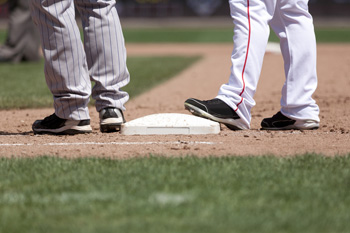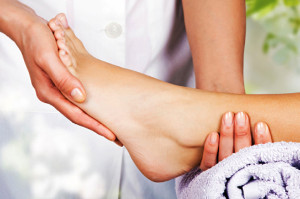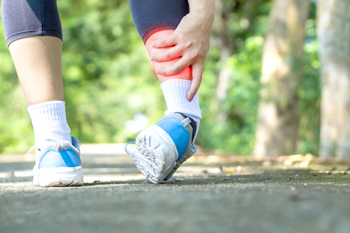Connect With Us
Blog
Do Your Child's Feet Hurt?
Astros Player Strong After Achilles Tendon Rupture
 Pitcher Joe Smith of the Houston Astros was facing a long and tough recovery when he ruptured the Achilles tendon in his right ankle last December. Instead of choosing to end his career, however, Smith took on rehabilitation after receiving surgery for the repair. Smith’s decision has proven to be the right one, as the player made his return to the field for the first time this year on July 14th, and he’s been strong and solid since. Smith has played 20 games for the Houston Astros since his return, and in those games, he’s allowed only three earned runs. The pitcher’s proven resilience has made him a key player for the Astros as they move forward. If you believe that you’ve experienced an Achilles tendon injury, consult with your podiatrist.
Pitcher Joe Smith of the Houston Astros was facing a long and tough recovery when he ruptured the Achilles tendon in his right ankle last December. Instead of choosing to end his career, however, Smith took on rehabilitation after receiving surgery for the repair. Smith’s decision has proven to be the right one, as the player made his return to the field for the first time this year on July 14th, and he’s been strong and solid since. Smith has played 20 games for the Houston Astros since his return, and in those games, he’s allowed only three earned runs. The pitcher’s proven resilience has made him a key player for the Astros as they move forward. If you believe that you’ve experienced an Achilles tendon injury, consult with your podiatrist.
Achilles tendon injuries need immediate attention to avoid future complications. If you have any concerns, contact one of our podiatrists of Foot & Ankle Associates of Maine. Our doctors can provide the care you need to keep you pain-free and on your feet.
What Is the Achilles Tendon?
The Achilles tendon is a tendon that connects the lower leg muscles and calf to the heel of the foot. It is the strongest tendon in the human body and is essential for making movement possible. Because this tendon is such an integral part of the body, any injuries to it can create immense difficulties and should immediately be presented to a doctor.
What Are the Symptoms of an Achilles Tendon Injury?
There are various types of injuries that can affect the Achilles tendon. The two most common injuries are Achilles tendinitis and ruptures of the tendon.
Achilles Tendinitis Symptoms
- Inflammation
- Dull to severe pain
- Increased blood flow to the tendon
- Thickening of the tendon
Rupture Symptoms
- Extreme pain and swelling in the foot
- Total immobility
Treatment and Prevention
Achilles tendon injuries are diagnosed by a thorough physical evaluation, which can include an MRI. Treatment involves rest, physical therapy, and in some cases, surgery. However, various preventative measures can be taken to avoid these injuries, such as:
- Thorough stretching of the tendon before and after exercise
- Strengthening exercises like calf raises, squats, leg curls, leg extensions, leg raises, lunges, and leg presses
If you have any questions please feel free to contact our office located in Brunswick, ME . We offer the newest diagnostic tools and technology to treat your foot and ankle needs.
What Are The Benefits Of Having Foot Massages?
 A popular form of foot therapy includes foot massages. Many people find relief at the end of a work day by having their feet gently massaged. This can be beneficial in relieving pain and discomfort the feet may have endured during the day. Additionally, it may be easier to relax and sleep after a massage has been performed, and pain may be minimized throughout the body. Before beginning a foot massage, it can be helpful to soak the feet in warm water, followed by applying massage oil on the feet and ankles. An effective method of starting this type of therapy includes performing warm up twists, which allows the feet and ankles to prepare for the remainder of the massage. If more information is needed on the benefits of having regular foot massages, it is suggested that you schedule a consultation with a podiatrist.
A popular form of foot therapy includes foot massages. Many people find relief at the end of a work day by having their feet gently massaged. This can be beneficial in relieving pain and discomfort the feet may have endured during the day. Additionally, it may be easier to relax and sleep after a massage has been performed, and pain may be minimized throughout the body. Before beginning a foot massage, it can be helpful to soak the feet in warm water, followed by applying massage oil on the feet and ankles. An effective method of starting this type of therapy includes performing warm up twists, which allows the feet and ankles to prepare for the remainder of the massage. If more information is needed on the benefits of having regular foot massages, it is suggested that you schedule a consultation with a podiatrist.
Foot therapy is often necessary for those recovering from either foot deformities or foot injuries. If you have concerns regarding therapy, consult with one of our podiatrists from Foot & Ankle Associates of Maine. Our doctors can provide the care you need to keep you pain-free and on your feet.
Most Common Injuries
People who are active or athletes are prone to a variety of injuries. Therefore, it is often important to take part in physical therapy in order to quickly get back on the right track.
What to Do When Injured
Physical Therapy – This specialized treatment will focus on the affected area, speeding up recovery and the overall healing process. It is a proven method that has helped millions of people return from any injury.
During physical therapy you will undergo regimented training to get back into full form. Training is often very difficult, especially at first when the foot feels weak. Physical therapy often involves:
Basic stretching and twisting exercises – getting the feet’s mobility and flexibility up.
Massaging – the therapist will massage the injured area in order to activate the muscles and relax them.
Strengthening Exercises – this allows the muscles in the affected area to regain their full strength, a vital step towards full recovery.
If you have any questions please feel free to contact our office located in Brunswick, ME . We offer the newest diagnostic tools and technology to treat your foot and ankle needs.
Possible Causes of Ankle Sprains
 When your ankle rolls to one side after unexpectedly stepping off of a curb, the pain and discomfort that often accompanies this type of injury can be intense. Many patients have difficulty walking after incurring an ankle injury, and running activities are temporarily impossible to partake in. An ankle sprain typically consists of damaged ligaments that comes from being stretched too far. Common symptoms of an ankle injury often include swelling and throbbing on and around the affected area, severe pain and discomfort while attempting to move it, and it is often tender when touched. Moderate relief can be obtained while elevating the ankle. This may help in diminishing a portion of the swelling. After a proper diagnosis is performed, which typically consists of having an X-ray taken, the ankle will generally be wrapped in an elastic bandage that can provide adequate support. It is strongly advised that you seek the counsel of a podiatrist who can properly treat ankle injuries.
When your ankle rolls to one side after unexpectedly stepping off of a curb, the pain and discomfort that often accompanies this type of injury can be intense. Many patients have difficulty walking after incurring an ankle injury, and running activities are temporarily impossible to partake in. An ankle sprain typically consists of damaged ligaments that comes from being stretched too far. Common symptoms of an ankle injury often include swelling and throbbing on and around the affected area, severe pain and discomfort while attempting to move it, and it is often tender when touched. Moderate relief can be obtained while elevating the ankle. This may help in diminishing a portion of the swelling. After a proper diagnosis is performed, which typically consists of having an X-ray taken, the ankle will generally be wrapped in an elastic bandage that can provide adequate support. It is strongly advised that you seek the counsel of a podiatrist who can properly treat ankle injuries.
Although ankle sprains are common, they aren’t always minor injuries. If you need your ankle injury looked at, contact one of our podiatrists from Foot & Ankle Associates of Maine. Our doctors can provide the care you need to keep you pain-free and on your feet.
How Does an Ankle Sprain Occur?
Ankle sprains are the result of a tear in the ligaments within the ankle. These injuries may happen when you make a rapid shifting movement while your foot is planted. A less common way to sprain your ankle is when your ankle rolls inward while your foot turns outward.
What Are the Symptoms?
- Pain at the sight of the tear
- Bruising/Swelling
- Ankle area is tender to touch
- In severe cases, may hear/feel something tear
- Skin discoloration
Preventing a Sprain
- Wearing appropriate shoes for the occasion
- Stretching before exercises and sports
- Knowing your limits
Treatment of a Sprain
In many cases, the RICE method (Rest, Ice, Compression, and Elevate) is used to treat ankle sprains. However, you should see a podiatrist to see which treatment option would work best with your injury. In severe cases, surgery may be required.
It is important to ask your doctor about rehab options after you receive treatment for your injury. Stretching, strength training, and balance exercises may help the ankle heal while also preventing further injury.
If you have any questions, please feel free to contact our office located in Brunswick, ME . We offer the newest diagnostic and treatment technologies for all your foot care needs.

